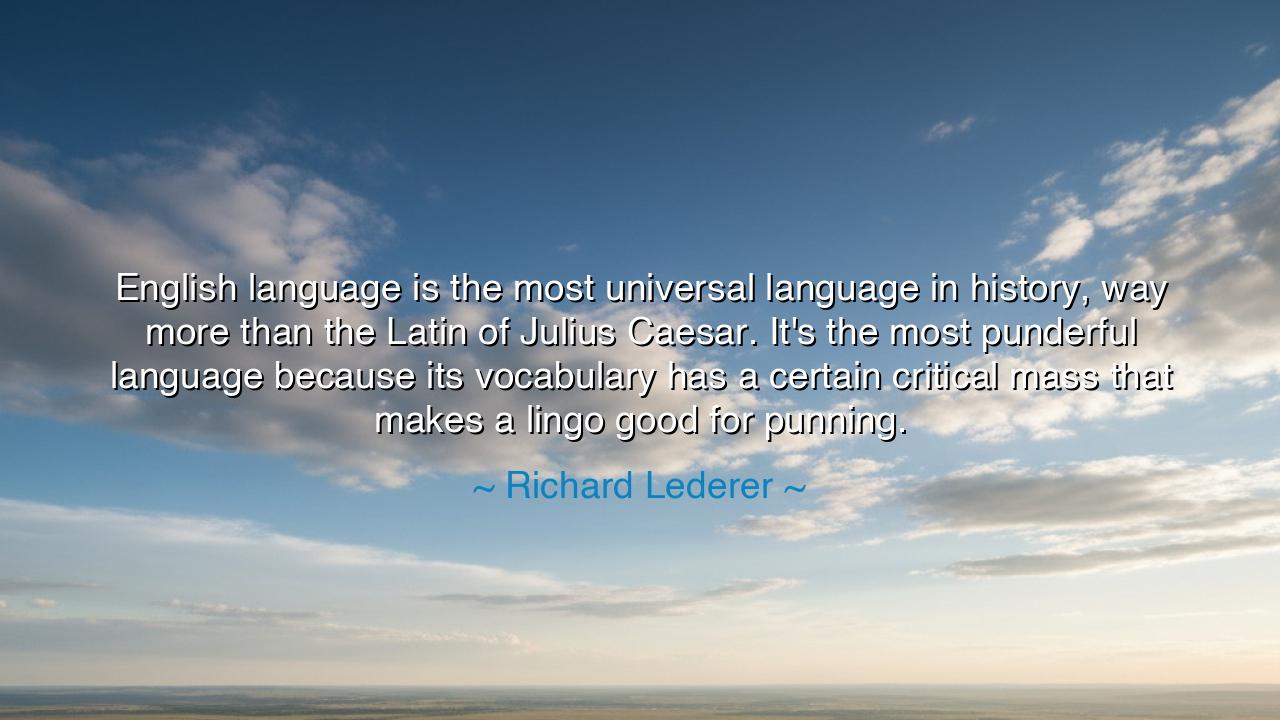
English language is the most universal language in history, way
English language is the most universal language in history, way more than the Latin of Julius Caesar. It's the most punderful language because its vocabulary has a certain critical mass that makes a lingo good for punning.






The wordsmith Richard Lederer, a lover of language and wit, once declared: “English language is the most universal language in history, way more than the Latin of Julius Caesar. It’s the most punderful language because its vocabulary has a certain critical mass that makes a lingo good for punning.” In this playful yet profound utterance lies a truth both ancient and modern — that language is not merely a tool for speech, but a living mirror of human thought. And among all tongues that have risen and faded through the ages, English stands like a great oak whose roots sink deep into many soils, whose branches reach into every sky.
To understand this saying, we must first look to the origin of universality itself. In the time of Julius Caesar, the Latin tongue ruled from Britain to Egypt, binding the empire through word as much as through sword. Yet even mighty Latin, for all its elegance and rigor, was confined to the dominions of its conquerors. When Rome fell, its language waned, surviving only in the sanctuaries of scholars and priests. But English, born from the mingling of Saxon, Norse, and Norman blood, became something far greater — a language not of empire alone, but of exchange, invention, and imagination. It absorbed from all who touched it, taking freely as the sea receives every river.
This is what Lederer calls its universality. For today, English travels not by conquest but by communication. It is the tongue of commerce, of science, of the digital realm that binds our world. From the markets of Mumbai to the streets of Nairobi, from the classrooms of Seoul to the stages of New York, English flows as a living current, connecting hearts and minds across the globe. Yet its power lies not only in its reach, but in its richness — its critical mass of words, gathered from centuries of blending cultures, each one leaving a mark like a color upon a vast canvas.
And within this abundance lies its playfulness. Lederer calls English the “most punderful” of all tongues, and rightly so. Its vast vocabulary and flexible structure make it fertile ground for wit and wordplay. No other language bends so easily, allowing one phrase to carry many meanings, one sound to spark a dozen thoughts. A poet may weave double meanings like threads of gold; a humorist may twist words until they shimmer with laughter. The pun, the riddle, the rhyme — these are the jewels of English speech, and through them, language itself becomes a game of the spirit. It is not mere communication, but creation.
Consider the legacy of Shakespeare, who understood this truth better than any. His plays teem with puns, turns of phrase, and new words of his own invention. “Now is the winter of our discontent,” he wrote — and in that single line, the world of history, weather, and emotion all collide. Shakespeare’s English was not the sterile tongue of textbooks, but the living, breathing force of a people discovering themselves through sound. His mastery of punning was not frivolity; it was revelation — a way to reveal the multiple faces of truth within a single word.
But the universality of English is not merely a triumph of intellect — it is also a burden of stewardship. For language shapes thought, and the more a tongue spreads, the more it must be used wisely. When Lederer praises English as the richest of languages, he also calls upon its speakers to honor that richness — to wield it not as a weapon of arrogance, but as an instrument of understanding. For a universal language must serve a universal spirit: compassion, curiosity, and connection. Without these, even the most beautiful words turn hollow.
So let this be the lesson: treasure your language — whether it is English or another — but if you speak English, speak it with awareness. Let its words be bridges, not barriers. Play with its sounds, rejoice in its puns, and learn from its infinite shades of meaning. For to master language is to master thought, and to play with language is to touch the divine spark of creation itself. As the ancients shaped their myths from the breath of gods, so we shape our future with the breath of speech. And in this vast and punderful tongue, we hold the power to unite the world — one word, one laugh, one understanding at a time.






AAdministratorAdministrator
Welcome, honored guests. Please leave a comment, we will respond soon